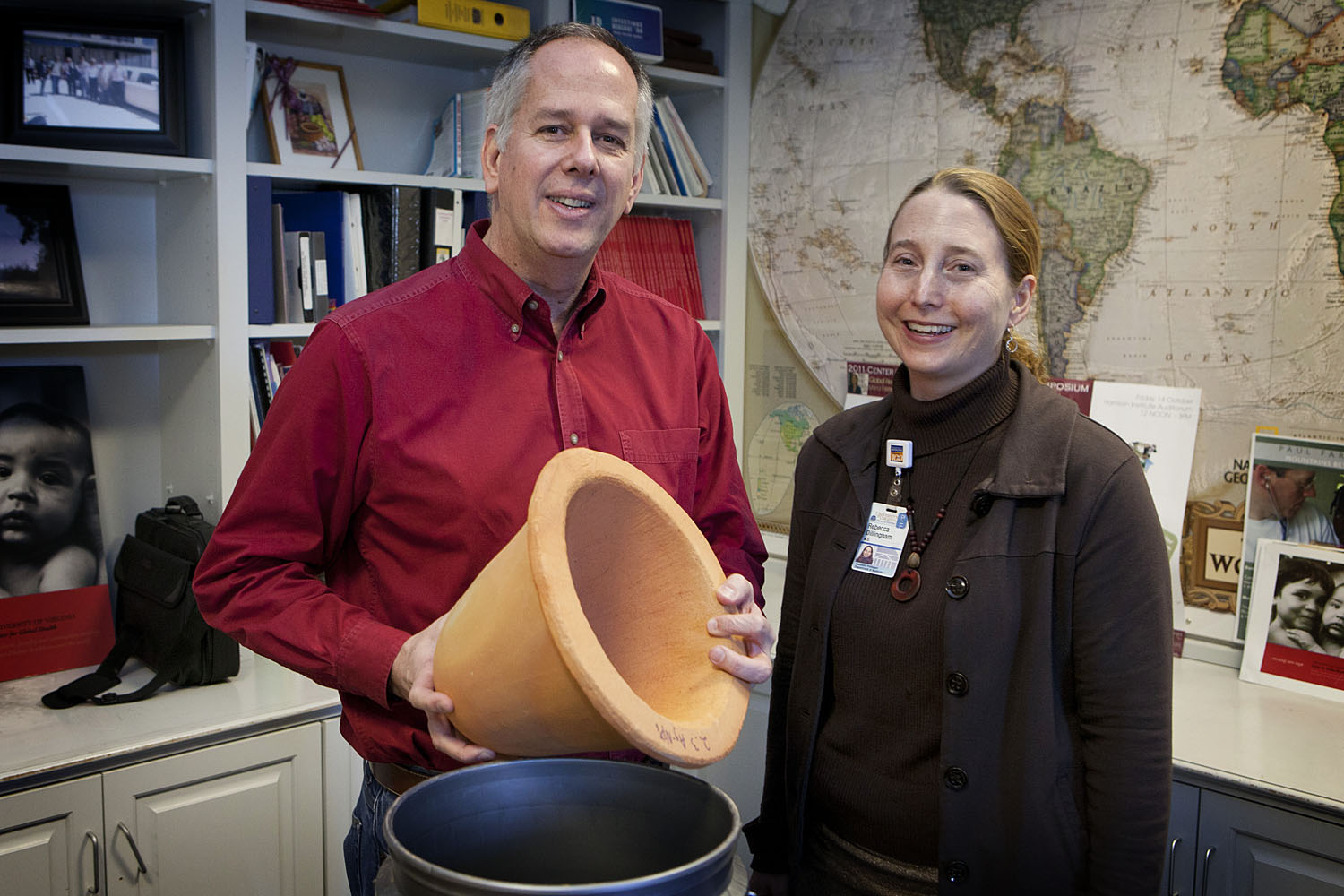A ceramic water filtration device that looks like a clay flowerpot may someday play a large role in reducing waterborne infectious diseases in developing countries.
Faculty and students from an array of disciplines at the University of Virginia are working together to build a mini-industry in South Africa and Guatemala aimed at improving the safety of water and the health of people who don't have regular access to purified water.
"Of the world's 7 billion people, less than 2 billion have a consistent supply of high-quality, regulated water," said James Smith, a U.Va. civil and environmental engineer, who co-leads the project. "And about 3- to 4 million people die each year from waterborne diseases, including about 2 million children. We're looking to help reduce those numbers."
Dr. Rebecca Dillingham, a U.Va. infectious diseases and international health physician and associate director of the University's Center for Global Health, co-leads the project with Smith. She added, "The deaths associated with waterborne diseases are tragic, but they are only part of the story. Children that experience multiple episodes of waterborne diseases are robbed of the nutrients they need to grow physically and cognitively."
To address these issues, Smith and Dillingham co-led an interdisciplinary project called PureMadi, which is part of a larger collaboration, Water and Health in Limpopo (South Africa), bringing together U.Va. professors and students in engineering, architecture, medicine, nursing, business, commerce, economics, anthropology and foreign affairs to provide sustainable solutions to global water problems.
PureMadi ("madi" is the Tshivenda South African word for water) has earned financial support from the National Science Foundation and the National Institutes of Health as well as U.Va.'s Jefferson Public Citizen Program and the Office of the Vice Provost for International Programs.
Tonight, the School of Engineering and Applied Science's Graduate Student Council will host the inaugural celebration of PureMadi in the Jefferson Ballroom of Alumni Hall. Tickets for the fundraising event are sold out.
PureMadi's first project is the development of a sustainable, ceramic water filter factory in Limpopo. It will serve as both a model and funding source for factories throughout the region and the developing world. The organization's 10-year goals are to set up 12 factories, produce 100,000 filters per year and improve the water quality for half-a-million people each year.
"These easy-to-use filters are designed for household use and are produced with local materials and local labor," Smith said. "The idea is that local populations will benefit economically and health-wise by producing a safe-water product for their own communities."
Funds earned from sales of the filters will be returned to the communities where they are made, thereby promoting a sustainable business enterprise, Smith said.
The filters are made using local clay, sawdust and water. The materials are mixed according to proper proportions and then pressed in a mold to the shape of a pot that can rest perfectly on the rim of a five-gallon bucket. The pot is fired in a kiln at more than 1,600 degrees Fahrenheit.
During firing, the clay becomes a ceramic and the sawdust burns off, leaving a ceramic with extremely fine pores. The filter is then painted with a thin solution of silver nanoparticles that lodge in the pores, serving as a highly effective disinfectant for waterborne pathogens, including Vibrio cholerae and Escherichia coli, both of which can cause severe diarrhea, vomiting and dehydration.
"Testing in our lab shows that the silver nanoparticle-treated ceramic can filter out 99.9 percent of the pathogens," Smith said.
Smith said each filter should have a lifespan of two to five years and will cost $10 to $12. A study by a Jefferson Public Citizens team of students advised by Smith and Dillingham in South Africa indicated that people would be willing to pay that price to obtain clean water at home.
The design allows a user to simply pour water from an untreated source, such as a well or river, into the pot and allow it to filter through into the five-gallon bucket underneath. The pot has a flow rate of one to three liters per hour, enough for drinking and cooking. The filtered water is accessed through a spigot in the bucket.
"Our studies of the effectiveness of these ceramic water filters show that they significantly improve the health outcomes for users in developing countries relative to people there who don't use them," Smith said.
The organization's partners include the University of Venda in Thohoyandou, South Africa; FilterPure Inc., a nonprofit organization committed to providing safe drinking water in the developing world; and local communities in Limpopo Province in South Africa.
– by Fariss Samarrai
Media Contact
Article Information
February 9, 2012
/content/university-virginias-puremadi-brings-clean-water-developing-countries

